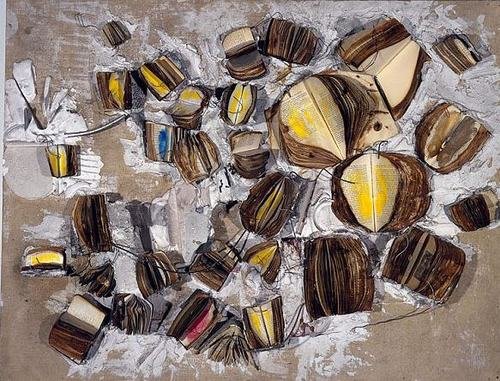John Latham
dal 1/10/2008 al 1/11/2008
Segnalato da
1/10/2008
John Latham
Flat Time House, London
An exhibition exploring the role of language and humour. Latham considered the house a 'living sculpture', with different rooms taking on the attributes of a living organism. At FTHo, a giant and colourful book-relief sculpture penetrates a large window on the front of the house in which a permanent installation of works demonstrating Latham's Time-Base Theory has been maintained.

Opening Exhibition: Distress of a Dictionary, 2 October – 2 November 2008
The Trustees of the John Latham Foundation today announced the opening of Flat
Time House (FTHo), the home of the late artist, to the public on 2 October 2008.
John Latham (1921 – 2006), one of the most important British artists of the post-war
period, lived at FTHo in Peckham, South East London for over 20 years. The House
is now home to the John Latham Foundation and the John Latham Archive, and will
be the primary location for a 10-month programme of exhibitions and events
exploring the artist’s practice, his theoretical ideas and their continued relevance.
The opening show, Distress of a Dictionary, will be a solo exhibition exploring the
role of language and humour in Latham’s work.
Latham considered the house a ‘living sculpture’, with different rooms taking on the
attributes of a living organism. At FTHo, a giant and colourful book-relief sculpture
penetrates a large window on the front of the house, known as the Face, into a room
called the Mind, in which a permanent installation of works demonstrating Latham’s
Time-Base Theory has been maintained. The next room is known as the Brain.
Latham described it as the space for ‘rational thought’ and this is where he worked
on his theoretical writing and correspondence. The Brain will now be home to the
John Latham Archive. The Hand, formerly Latham’s studio, will be the main location
for the programme of changing exhibitions and events. The remainder of the house
is taken up with what is termed the ‘Body Event’, where eating, sleeping and
‘plumbing’ take place. The name of the house derives from John’s theoretical
language, in which ‘Flat Time’ describes the way in which time and all possible
events can be represented by the length and width of a flat canvas, demonstrated in
works including Time-Base Roller (1972. Tate Collection).
In the painting and sculpture for which he is best known, Latham’s primary materials
included glass, books, canvas and the spray gun. Developing alongside this concise
visual language, from the mid-1950s onwards, was a cosmological theory,
formulated through his art-making discoveries that considered time and event to be
more primary than the established means of understanding, based on space and
matter. Termed Time-Base Theory it offers an ordering and unification of all events
in the universe including human actions, allowing an understanding of the special
status of the artist in society, and is articulated by a permanent installation at FTHo.
The programme at FTHo will explore important moments and themes within
Latham’s practice, including his involvement with underground culture in 1960s
London, his interest in ecological issues and solutions and a re-evaluation of his
work in film and video. Works by Latham’s contemporaries and collaborators will
also be exhibited, as well as pieces by a younger generation of artists influenced by
his practice. The programme at FTHo will run from October 2008 to July 2009 and is
supported by the John Latham Foundation and Lisson Gallery.
Latham has been associated with several national and international artistic
movements since he began showing work in the late 1940s. He is associated with
the first phase of conceptual art of the 1960s, was an important contributor to the
Destruction in Art Symposium of 1966, and was a founder member of the Artist
Placement Group (1966-89). Latham’s work has been exhibited internationally,
including recent solo exhibitions at Tate Britain (2005) and PS1, New York (2006).
His work has been included in numerous historic group shows and many survey
exhibitions of British Art since the 1960s including Live in Your Head (Whitechapel
Gallery, London, 2000), From Blast To Freeze (Kunstmuseum Wolfsburg, Germany,
2003) and Art and the 60s: This was tomorrow (Tate Britain, 2004). Latham’s work is
held in collections worldwide, including Tate Collection and MoMA.
John Latham’s work has been represented by Lisson Gallery since 1970.
http://www.lissongallery.com/#/artists/john-latham/
For further information about the John Latham Foundation, Archive and Flat Time
House,
please contact Elisa Kay, Curator at elisa@flattimeho.org.uk,
+44 (0)20 7207
4845 or +44 (0)7968 052 303.
For press enquiries please contact Catherine Mason at Calum Sutton PR,
catherine@suttonpr.com or +44 (0)20 7340 1416.
Flat Time House
210 Bellenden Road London SE15 4BW
Hours: (during exhibitions): Thursday – Sunday, 11am – 5pm
Admission: Free



